Home > Issues
> Men's
Health > Andrology and Discrimination Against Men |
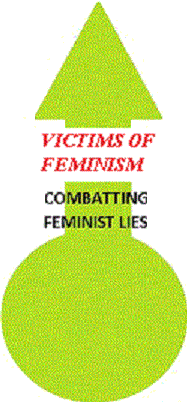
|
Empowering Men:
|
Andrology and Discrimination Against
Men (five times updated)
Peter Zohrab 2016-7 |
|
|
|
|
|
“What information you possess as to the equity, human
rights and medical issues surrounding the need to have an Andrology
specialty and an Andrology ward at Wellington Hospital, as well
as the current Gynecology and Obstetric specialties and wards.”
I have never received a direct answer from the Capital and Coast
District Health Board, but I resorted to asking the Ombudsman to intervene,
and it was from the Ombudsman that I received the news that the Capital
and Coast District Health Board had admitted that:
“it did not hold any information ‘as to the equity,
human rights and medical issues surrounding the need to have an
Andrology speciality and an Andrology ward' at Wellington Hospital.
The CCDHB advised this Office that it had made enquiries with clinical
staff, and checked its policy and documentation database, and 'are
not aware of any other agencies that may hold this information'.”
-
There are two Acts of Parliament (the New Zealand Bill of Rights
Act 1990 and the Human Rights Act 1993) which make discrimination
on the basis of sex illegal in certain circumstances;
-
The Capital and Coast District Health Board discriminates against
men by not having a male health specialty, which would be able to
do for male health what Gynecology does for women’s health
– i.e. find linkages and conduct holistic or cross-system
studies which would probably reveal relevant information;
-
Women have gained huge rights and privileges on the basis of the
claim that Feminism was about equality in the face of male oppression;
-
If men complain that women have advantages over men, Feminists
just respond that men should form their own pressure-groups! Why
would men need their own pressure-groups if Feminists were promoting
EQUALITY?
-
In fact, men have discriminated against men and in favour of women,
as the Andrology issue makes clear;
-
Moreover, once women get jobs and power, they do *NOT* (usually)
work towards equality, but perpetuate – and increase –
the anti-male discrimination that already exists;
-
This is demonstrated by the fact that the Capital and Coast District
Health Board *does not even have any information relevant to the
issue of having (or not having) a male health specialty*, so it
is purely acting on the basis of Female Chauvinism and Misandry
(man-hatred).
As a matter of urgency, could you please initiate
a feasibility study into the introduction of Andrology to New Zealand
medical schools, hospitals, the Health Ministry itself and District
Health Boards?
|
I eventually received the following response
(by email):
|
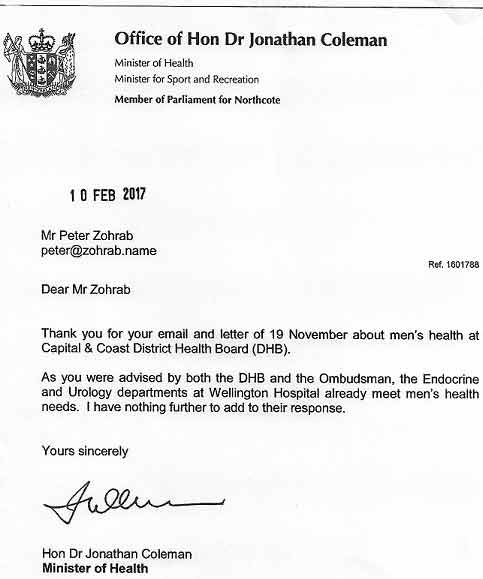
|
Below is my reply to Jonathan Coleman's letter:
|
Dear Dr. Coleman,
"Endocrine and Urology departments … already meet men’s
health needs."
As I understand them, the relevant issues and definitions are as follows:
-
The endocrine system is the collection of glands of an organism
that secrete hormones directly into the circulatory system to be
carried towards distant target organs.These glands include both
specialized endocrine organs and other parts of the body which have
secondary endocrine functions (according to Wikipedia).
-
Urology is the branch of medicine that focuses on surgical and
medical diseases of the male and female urinary tract system and
the male reproductive organs (according to Wikipedia).
-
Obstetrics is the field of study concentrated onpregnancy,childbirth
, and the postpartum period (according to Wikipedia).
-
The human male reproductive system consists of the penis, the
scrotum (including the testes), the epididymis, the vas deferens,
the seminal vesicles, the prostate gland and the bulbourethral glands
(according to Wikipedia).
-
The parts of the male reproductive system that have no role in
the urinary tract system are the scrotum (including the testes),
the epididymis, the vas deferens, the seminal vesicles, the prostate
gland and the bulbourethral glands, although an enlarged prostate
gland can have effects on urinary flow.
-
In other words, the penis is the only one of the seven components
of the male reproductive system that has any role in the urinary
system.
-
The human female reproductive system consists of the uterus ,
fallopian tubes, labia ,clitoris , vagina and ovaries (according
to Wikipedia). The mammary glands are present in both sexes, can
become cancerous in both sexes, but usually produce milk only in
females.
-
The parts of the male and female reproductive systems that have
endocrine functions are the testes, the ovarian follicle, the corpus
luteum (also in the ovary), the placenta (during pregnancy) and
the uterus (during pregnancy) (according to Wikipedia).
-
Thus the female reproductive system is more involved with the
endocrine system than the male reproductive system is.
-
In other words, the only one of the seven components of the male
reproductive system that has an endocrine function is the testes.
-
The male reproductive system is simply tacked onto the male urinary
system, as far as teaching, research, prevention and treatment are
concerned.
I note that:
-
The male and female reproductive systems contain roughly the same
number of parts (seven for the male and about six for the female).
-
When a female is pregnant, her uterus becomes very large in comparison
with the male reproductive system, but pregnancy is the subject
of its own medical specialty or sub-specialty: obstetrics.
-
The female reproductive system is more involved with the endocrine
system than the male reproductive system is.
-
The only one of the seven components of the male reproductive
system that has an endocrine function is the testes.
-
The only one of the seven components of the male reproductive
system that has any role in the urinary system is the penis.
-
Male life expectancy is less than female life expectancy and –
for all you know – that is a result of not having resources
devoted to andrology, the male health specialty.
Under the Official Information Act, could you please inform me:
-
what information you have which justifies New Zealand having the
female specialty of gynecology, but not a male specialty of andrology
and
-
what measure or criterion you have used to determine what New
Zealand men’s health needs and women’s health needs
are – given that women outlive men, on average.
I put it to you that men in power look after women’s health
needs, but women in power in the health system are callous towards men’s
health needs.
Yours sincerely,
Peter Zohrab |
In due course, I received the following further reply:
|
Dear Peter Zohrab
On behalf of Hon Dr Jonathan Coleman, Minister of Health, thank you
for your email received 26 March 2017 requesting under the Official
Information Act 1982:
1.what information you have which justifies New Zealand having the
female specialty of gynecology, but not a male specialty of andrology
and
2.what measure or criterion you have used to determine what New Zealand
men’s health needs and women’s health needs are –
given that women outlive men, on average.
The information requested appears to be more closely associated with
the functions and responsibilities of the Ministry of Health. Accordingly,
I am transferring your request to the Director-General of Health and
Chief Executive of the Ministry of Health, Chai Chuah, under section
14 (b) (ii) of the Official Information Act 1982.
Melissa Buckle
Private Secretary
– Health Office of the Hon Dr Jonathan Coleman
Minister of Health,
Minister for Sport and Recreation |
I subsequently complained to the Ombudsman
as follows:
|
Dear sir/Madam,
Could you please review and investigate the reply below from the
office of the Minister of Health to my request for Official Information
(below)?
I do not object to receiving a reply from the Ministry of Health,
as well, but the Minister himself had expressed or implied the political
opinion (see attached letter) that he knew what men's health needs were
and therefore knew that Wellington Hospital already met those needs.
Since he has apparently had a career as a General Practitioner, I assume
that he was expressing a personal view, rather than basing himself on
advice from officials.
Could you please therefore ask him to provide that Official Information
as Minister, rather than relying solely on his Ministry? It is a political
matter to establish what the health needs of any section of the community
are.
Yours sincerely,
Peter Zohrab |
I soon received the following reply from the Ombudsman:
|
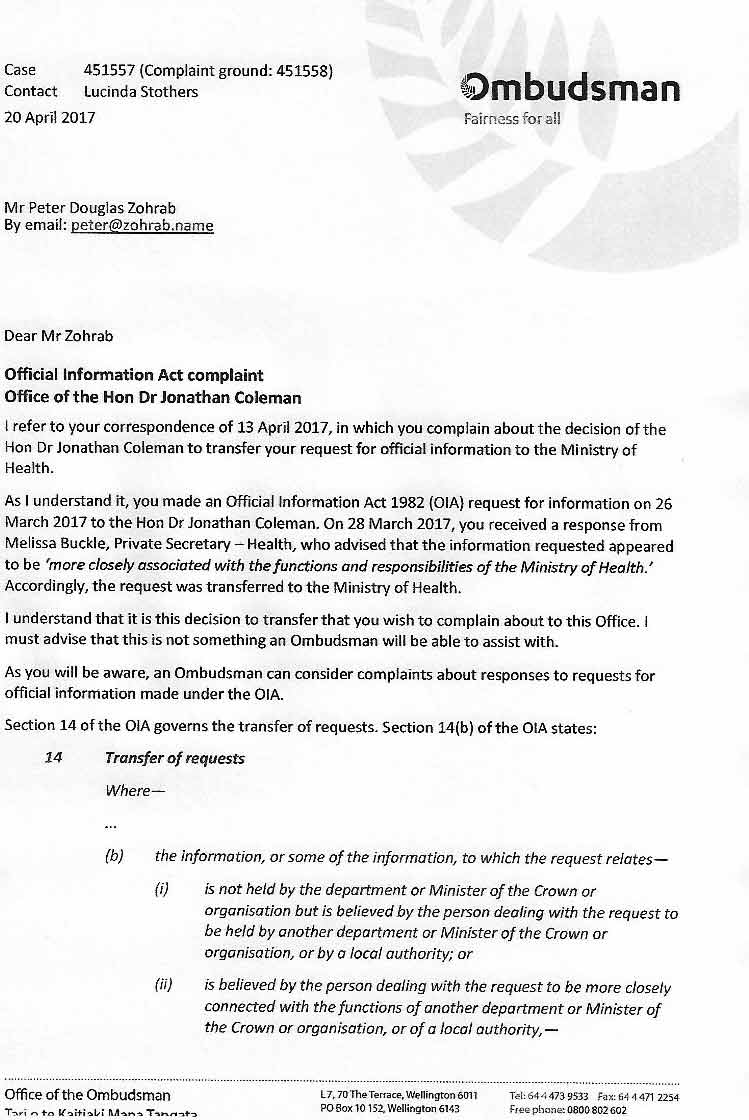 |
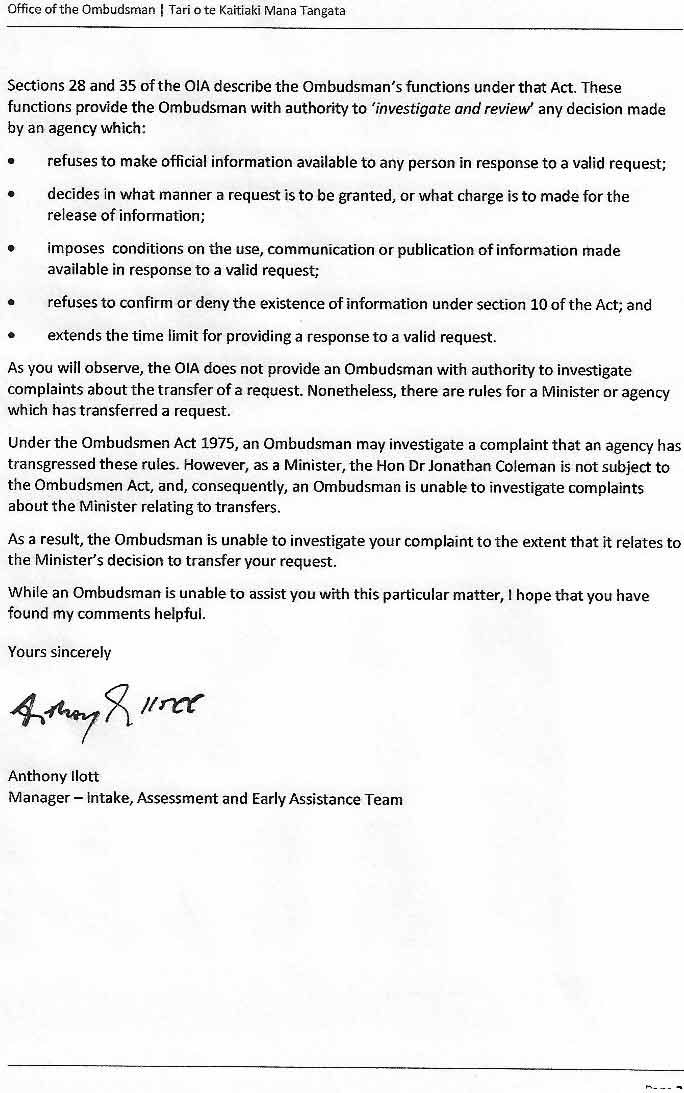 |
I had already received the following reply from the Ministry of Health:
|
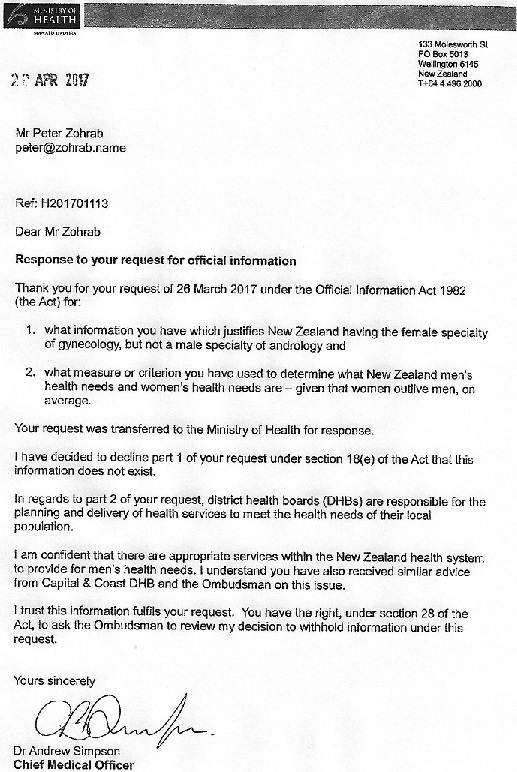 |
See also:
|
| |
Webmaster |
|
Latest Update |
19 September 2022 |
|
|
|




